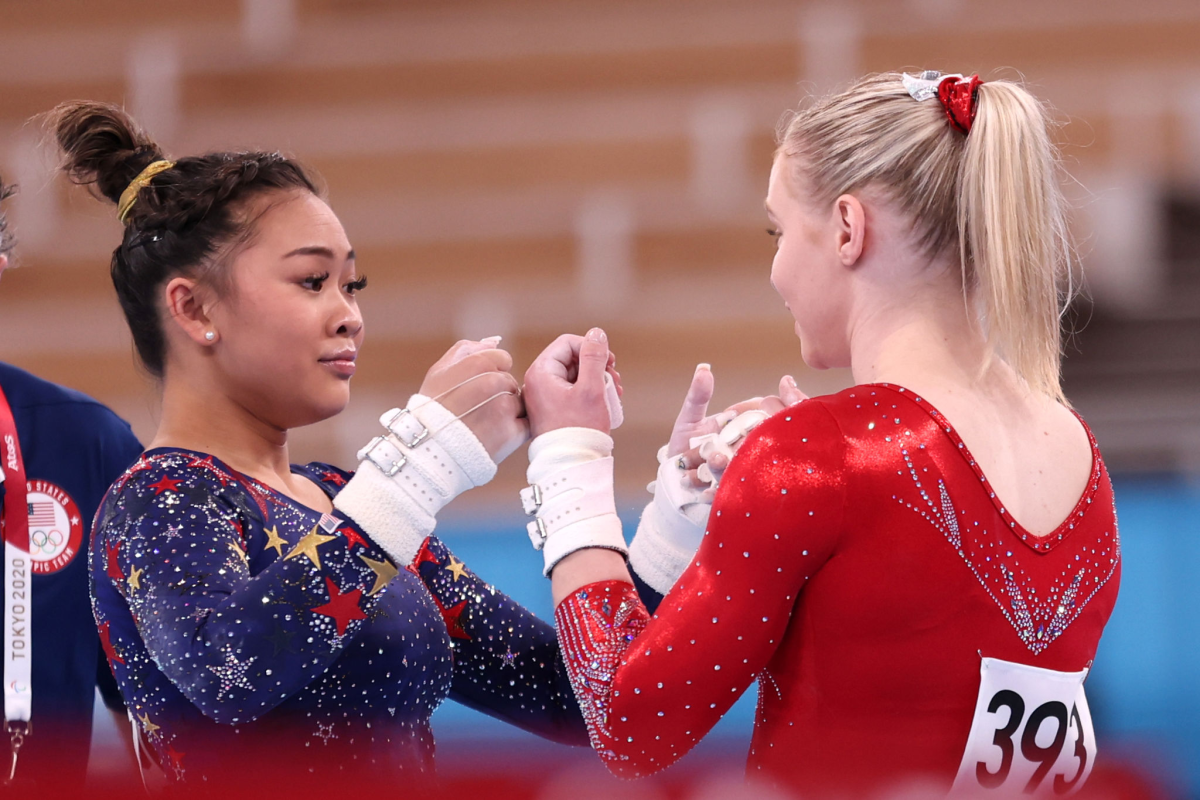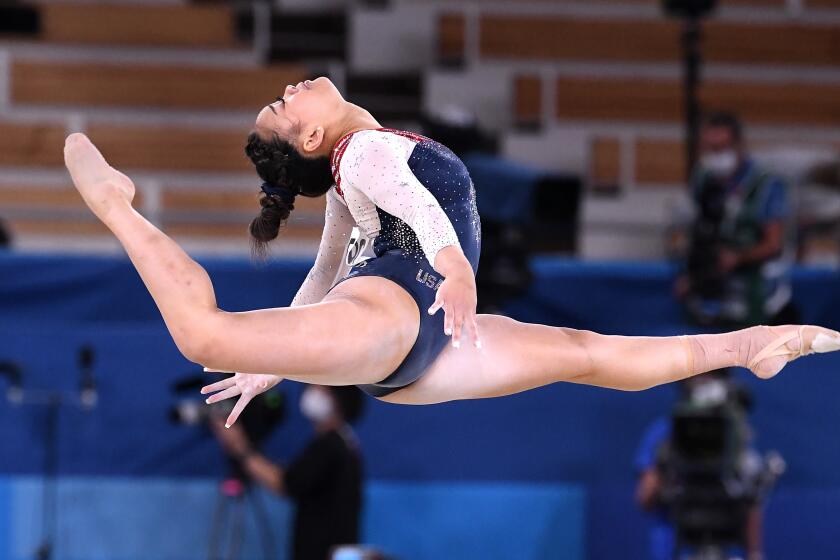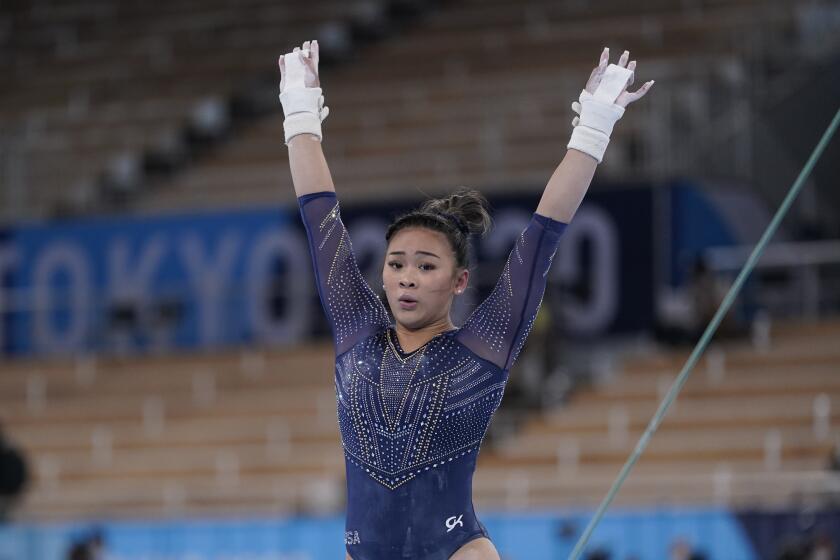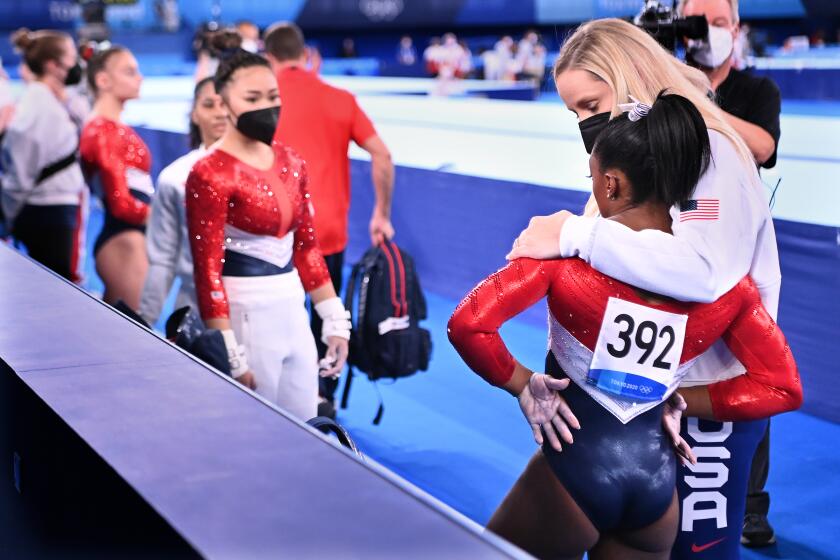What’s next for Olympic gold medalists Suni Lee and Jade Carey? College gymnastics

- Share via
Since gymnast Suni Lee won the Olympic all-around title on July 29, her social media accounts have been buzzing. She now has more than 1.3 million Instagram followers — a three-fold increase from before the Games — which, a few years ago, would have created a million-dollar question for the breakout star of the Tokyo Games.
Capitalize on her new-found fame with endorsements or go compete in college?
Instead, Lee won’t have to choose. The three-time Olympic medalist is heading to Auburn and, with new name, image and likeness rules enacted this summer, is part of a large group of Olympic gymnasts who can have what Auburn coach Jeff Graba calls “the best of both worlds.”
“From the NCAA perspective, we’re going to have some of the brightest lights join our ranks and I think from an individual perspective, it extends their careers,” Graba said. “They can actually still compete in college, they can work their routines around so they can be NCAA competitive but still stay in the lime light.”
U.S. gymnast Suni Lee won the all-around gold medal at the Tokyo Olympics, taking the lead after the third of four rotations.
Nine of the 17 gymnasts who competed at the U.S. Olympic trials will be competing in college this coming school year, including seven of the 10 athletes who went to Tokyo to compete or serve as replacements.
Along with Lee, who will be the first Olympic all-around gold medalist to compete in college, the NCAA will welcome Olympic medalists Jade Carey (Oregon State), Jordan Chiles (UCLA) and Grace McCallum (Utah) and U.S. replacement athletes Leanne Wong (Florida), Emma Malabuyo (UCLA) and Kara Eaker (Utah). Kayla DiCello, who was part of the four-person replacement team that traveled to Tokyo in case any members of the top squad were sidelined because of coronavirus concerns, is committed to Florida for 2022.
When the elite gymnasts make the transition to college, they are expected to dominate in the gym after competing at the highest level in the sport, but have to adjust to new training and scoring rules. Elite gymnasts typically train for at least 40 hours a week. NCAA rules limit practice to only 20 hours a week. School work is also a high priority.
Unlike Olympic routines that use an open-ended scoring system that combines difficulty and execution, NCAA routines are judged on a simple perfect 10 that prioritizes precision and form. For example, Lee has seven release skills in her bronze medal-winning uneven bar routine but will need no more than two in an NCAA set.
A bronze medal in the uneven bars final on Sunday completed Suni Lee’s set of Tokyo Olympic hardware.
With less focus on difficulty, gymnasts are allowed to show more personality and dance in routines on beam and floor. The result is viral performances that have helped grow attention for NCAA gymnastics outside the Olympic spotlight.
The 2019 NCAA championship meet in Fort Worth, featured a record-setting crowd on the heels of UCLA’s Katelyn Ohashi’s popularity and the 2021 championship was the most-viewed gymnastics championship on the ESPN networks ever. An average of 808,000 viewers, a 510% increase from the 2019 final, tuned in to see Michigan win its first national title in program history.
While a select group of programs once dominated the sport, the influx of elite gymnasts who scatter to different schools will create more parity in the sport, said Olympic silver medalist Samantha Peszek, who competed for UCLA after her elite career, and more schools could be encouraged to add women’s gymnastics programs.
“It just keeps upping the game,” said Utah coach Tom Farden, who also coached Olympic silver medalist MyKayla Skinner in college. “These Olympic-level athletes want to continue their career in the NCAA and have that experience. It’s a very enriching experience for these women and one that these Olympic athletes won’t want to miss out on.”
Elliott: Simone Biles pulls out of women’s gymnastics final, lets world know it’s OK to not be OK
U.S. gymnast Simone Biles says her belief you must ‘put mental health first before your sport’ prompted her to withdraw from team competition.
The dream of competing in college remained intact despite pandemic delays. Carey, 21, signed with Oregon State in 2017 and initially deferred for two years, planning to start school in 2020. When the pandemic postponed the event, Carey started coursework remotely while training in Arizona. Canadian all-arounder Brooklyn Moors, who is bound for UCLA after finishing 16th in the all-around final, took a similar plan last year.
Chiles, 20, twice deferred her enrollment at UCLA. When Chiles started to emerge as a top contender for a spot on the Olympic team this year, she said she was still looking forward to competing in college even though her star was rising. After Chiles unexpectedly stepped into the all-around during the team final to help Team USA secure a second-place finish, the Bruins are positive the wait will be worth it for their latest Olympian.
“She’s going to be phenomenal, can’t wait to get her to campus,” UCLA coach Chris Waller said. “That experience will shape her life for sure and it will certainly shape her experience on our team here at UCLA.”
More to Read
Go beyond the scoreboard
Get the latest on L.A.'s teams in the daily Sports Report newsletter.
You may occasionally receive promotional content from the Los Angeles Times.










